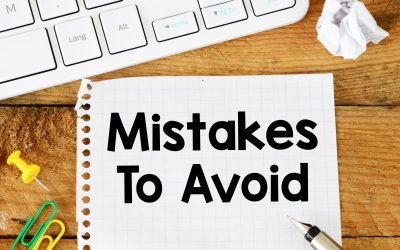
With the new year in full swing, tax season is just around the corner. Filing federal income taxes can be a long and complicated process, and mistakes are bound to happen here and there. As many of us know, these small mistakes can cost you big in tax returns and penalties. That’s why it never hurts to brush up on the basics involved with filing your taxes. Knowing the most common tax-filing mistakes is critical to preventing any slips and the serious headache that could result in IRS scrutiny. Keep reading to learn how you and your family or business can avoid making mistakes this tax season.
- Confirm Your Numbers
Make sure that your filing status, name, and the names and Social Security numbers of your dependents are accurate. It’s also not a bad idea to review the bank account numbers you included (some of those digits can be lengthy!). Next, let’s face it, not all of us are exceptional when it comes to math. Taxpayers should always confirm that their math is correct, as this is one of the most common mistakes made when filing.[1]
- Be Careful
Be cautious while entering information from your W-2s and forms alike. Wages, dividends, bank interest, and any other income that’s been reported to the IRS will be taken into account. The IRS will be looking to make sure that your income and this information match.[2][3] If you notice something off and need to dispute something, you can contact your employer or the business that made the specific transaction. They will then provide you with a revised and corrected form,[4] but make sure you do this early on in tax season!
- Is the Standard Deduction Right for You?
Taxpayers should also be wary of automatically assuming the standard deduction is right for them. It’s important to know whether it’s best for you to take the standard deduction or itemize your deductions on your return, as the decision could affect how much you owe in income taxes. Itemizing your deductions may be the right choice if you had large, uninsured medical or dental expenses, paid sizable amounts in mortgage interest or property taxes, had extensive business losses, or made significant contributions to certain charities.[5]
- Avoid Early Retirement Account Withdrawals if You Can!
Lastly, making an early withdrawal from a retirement account without an exempted reason can cost you. Furthermore, if you forget to put that information in your tax reports, you will get a letter from the IRS stating that you owe an additional tax on the early withdrawal amount plus the interest and penalties that have accrued on that additional amount until payment is made.[6]
Double-Check!
Some of the best advice when it comes to filing your taxes is to double-check! It’s better to go back and give yourself the time to review your information than it is to deal with the pain and consequences of silly mistakes. Be sure to confirm your entries, look out for typos, and avoid leaving anything blank. If you’re hoping to make tax season a little easier this year, reach out to our team for a complimentary review of your finances!



